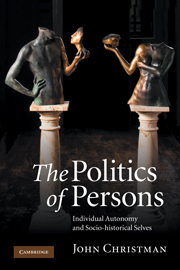1 - Introduction
Published online by Cambridge University Press: 15 December 2009
Summary
Who are you?
Really, how would you answer such a question, coming as it does from an anonymous and context-free page in a book? You might give your name, or some other designator that will pick you out (“I am the one reading this book here …”). But could you give a substantive, descriptive answer? Most likely, whatever comes to mind as a possible answer would depend on the point of asking the question. Different contexts would evoke different, or at least very differently organized, descriptions of yourself. Though the question that is really at issue here – and this will be one of the central themes of this book – is “who should I say you are …?” And I should quickly add, nothing I have said or want to say in what follows should preclude your answer beginning with the words “We are …”
Philosophical reflections on the nature of the self are wide ranging of course. One could say, in fact, that concern with the nature of persons, human nature, and the self represents some of the central topics of philosophy, in all its various traditions, throughout its history. Metaphysical accounts of the essential nature of (human) being have abounded in that history. Social and political philosophy, in its way, has taken up such theorizing and proceeded on the basis of assumptions about human nature, the self, and agency to construct or assume models of the subject of political and social institutions.
- Type
- Chapter
- Information
- The Politics of PersonsIndividual Autonomy and Socio-historical Selves, pp. 1 - 18Publisher: Cambridge University PressPrint publication year: 2009



